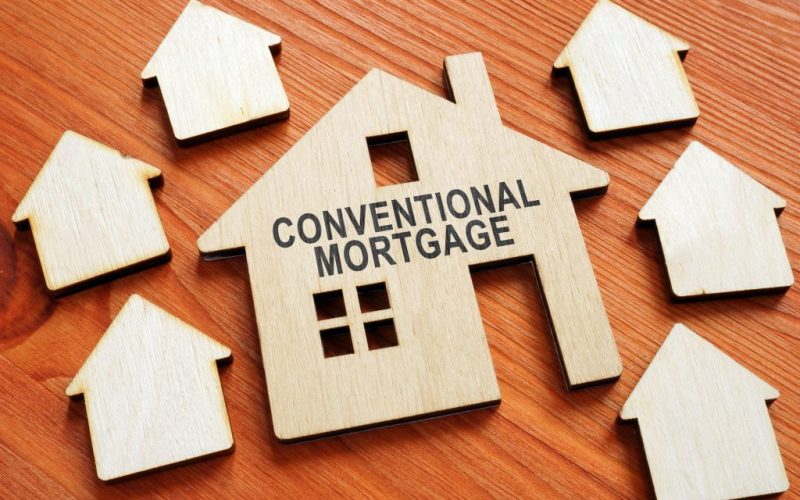If you’re looking for the most affordable house loan available, you’re probably looking for a conventional loan. However, before committing to a lender, it’s critical to understand the many types of conventional loans available to you. Each conventional loan choice will have its own set of requirements, rewards, and drawbacks. Here, we’ll discuss the conventional mortgage loan, the interest rates, and credit score requirements and see if it’s a good choice for you.
What is a Conventional Loan?
A conventional loan is one that is not guaranteed by a government body such as the Department of Veterans Affairs. Conventional mortgages frequently fulfill the down payment and income requirements imposed by Fannie Mae and Freddie Mac, as well as the loan restrictions imposed by the Federal Housing Finance Agency, or FHFA.
The requirement for a conventional loan is a credit score of at least 620, while a score of 740 or higher will help you get the best rate. Depending on your financial situation and the amount borrowed, you may be able to make a down payment of as little as 3% with a conventional loan. (However, keep in mind that a larger down payment may help you receive a cheaper rate.)
Conforming vs. Conventional Loans
Conventional loans are frequently referred to incorrectly as conforming mortgages or loans. While there is some overlap, the two categories are distinct. A conforming mortgage is one whose underlying terms and conditions match Fannie Mae and Freddie Mac’s funding criteria. The Federal Housing Finance Agency, for example, sets an annual dollar limit (FHFA). A loan shall not exceed $647,200 in most of the continental United States in 2022 (up from $548,250 in 2021).
Consequently, while all conforming loans are conventional, not all conventional loans are conforming. An $800,000 jumbo mortgage, for example, is a conventional mortgage but not a conforming mortgage because it exceeds the amount that can be underwritten by Fannie Mae or Freddie Mac.
What Are the Different Types of Conventional Loans?
When comparing lenders and mortgage choices, you may come across many sorts of conventional loans. Here are some of the most common, along with an explanation of how they work.
- Conforming conventional loans: They are loans that adhere to the rules established by Fannie Mae and Freddie Mac, including the maximum loan amounts outlined above.
- Jumbo loans: Jumbo loans allow you to borrow more than the maximum lending limit for conforming loans. They do, however, often necessitate a higher credit score, a lower debt-to-income ratio (DTI), and a larger down payment.
- Portfolio loans: These are conventional loans that a lender prefers to hold in its own portfolio rather than sell on the secondary market. This option permits the lender to be more flexible than the Fannie Mae and Freddie Mac regulations allow, particularly when it comes to credit scores and DTIs.
- Subprime loans: Conforming loans require a DTI of less than 50% and a credit score of 620 or better. However, if your credit isn’t quite up to par, you may be able to qualify for a subprime mortgage loan.
- Amortized Conventional Loans: These loans are fully amortized, so homebuyers have a fixed monthly payment from the start to the end of the loan payback period, with no balloon payment. Fixed or adjustable mortgage rates are available for amortized conventional loans.
- Adjustable-rate mortgage loans: A fixed-rate mortgage loan has the same interest rate—and thus the same monthly payment—for the duration of the loan. An adjustable-rate mortgage, on the other hand, provides a fixed interest rate for a specific length of time, often between three and ten years. Your interest rate will be adjusted annually based on market rates.
Loan Requirements For a Conventional Loan
You must meet the loan requirements to qualify for any sort of conventional mortgage loan. Conventional loans typically have more stringent requirements than government-backed loans, including:
#1. Credit score
If you imagine getting a conventional loan as a series of steps, the first stage would be your credit score. Mortgage lenders need a minimum credit score of 620 to qualify for a conventional loan. To get the highest interest rate and contract, you’ll need a considerably higher credit score, typically 740 or above.
#2. DTI (debt-to-income) ratio
Moving up the ladder, the next piece of information that a lender will look at is your debt-to-income (DTI) ratio. Your DTI ratio takes into account other monthly debts such as vehicle loans, student loans, and credit card debt. Most lenders will not allow this ratio to exceed 43%, while some may make an exception and allow up to 50%.
#3 Down Payment
Unlike some government-insured loans, a lender will not offer you 100 percent of the purchase price of a home in a conventional loan; you must be able to make a down payment. Many fixed-rate conventional loans for a primary dwelling (not a second home or investment property) allow for as little as a 3% or 5% down payment. If you take for a 3-percent down conventional loan to buy a $350,000 house, for example, you’ll need to pay down at least $10,500.
#4. Private Mortgage Insurance
The opportunity to put down only 3% is a tempting feature of conventional mortgages, but it comes with a payment: private mortgage insurance (PMI). Because you did not make a 20% down payment, PMI protects the lender in the event of a default. So, until you have 20 percent equity in your house — either by paying down your mortgage or increasing the value of your home — you must pay PMI.
#5. Loan Amount
The final step toward obtaining a conventional loan is determining how much money you need to borrow. Each year, the Federal Housing Finance Agency (FHFA) establishes restrictions for conforming to conventional loans. These differ depending on where the property is located. The limit for 2021 in the majority of the United States is $548,250. Limits of $822,375 apply in higher-priced areas such as California and New York City. Anything larger will necessitate a jumbo loan.
How to Obtain a Conventional Loan
If you’ve determined that a conventional loan is best for you, here’s how to get one:
#1. Examine your credit score.
Before you do anything else, you need to understand your credit situation. You can do this for free by checking your credit score with Experian. If your credit score is 620 or better, you may be eligible for a conforming conventional loan. And if it’s in the mid-to-upper-700s, you’ll be more likely to qualify for favorable loan terms.
#2. Put money aside for a down payment.
While many conventional loans do not demand a large down payment, the more money you put down, the more likely you are to qualify for a lower interest rate.
#3. Examine your debt-to-income ratio.
Lenders will consider your DTI in addition to your credit score. Lenders often prefer to see that your total monthly loans do not exceed 36% of your monthly gross income. They may stretch their necessary DTI to 43 percent or higher in some situations, but Fannie Mae and Freddie Mac will only accept 50 percent for conforming loans.
#4. Look into mortgage lenders.
Consider several mortgage providers, including what rates they offer, how the application process works, and whether you can apply online. Before applying, try to discover at least three to five lenders that you prefer.
#5. Obtain preapproval.
A mortgage preapproval is a document from a mortgage lender that effectively agrees to give you up to a particular amount of money to buy a home if certain conditions are met. During this procedure, the lender or broker will inform you whether any other changes are required to improve your eligibility to purchase a home.
What Are the Benefits of a Conventional Loan?
There is no one-size-fits-all mortgage loan, so it’s critical to understand the advantages and disadvantages of each of your options before making a decision. Here are some of the advantages of a conventional loan:
#1. Cheap interest rates:
Having a good credit score can help you qualify for a low-interest rate. Furthermore, after your loan-to-value ratio reaches 80%, you can request that they waive the insurance requirement. In contrast, the mortgage insurance cost associated with an FHA loan may continue throughout the life of the loan, as does the guarantee charge associated with a USDA loan.
#2. Higher loan limitations:
While conforming loans have limits, jumbo conventional loans can go even higher if necessary. Government-insured loans may not provide you with the same level of flexibility.
Some lenders have more latitude with conventional loans than with government-insured loans, owing to the fact that they are not required to follow the criteria imposed by those government bodies.
What Are the Drawbacks of a Conventional Loan?
Along with some of the advantages of obtaining a conventional loan over a government-backed loan, there are some drawbacks to consider:
#1. More credit score requirements:
To qualify for a conforming conventional loan, you normally need a credit score of at least 620, which is higher than what certain government-backed loans need.
#2. Higher down payment requirements:
If you’re a first-time homebuyer, certain conventional loan programs enable you to put down as little as 3% or perhaps nothing at all but expect to pay 5% after that. In comparison, FHA loans require a 3.5 percent down payment, while USDA and VA loans require no down payment at all.
#3. Stricter qualification criteria:
Government-insured mortgage loans pose less risk to the lender, so you may be able to qualify for one if you meet the agency’s qualifying requirements. In contrast, because the lender is taking on greater risk by originating the loan, your personal financial status may be inspected more extensively with a conventional loan.
What Makes a Conventional Mortgage Unique From Other Loan Types?
Let’s see how conventional loans stack up against some other common loan options.
VA Loans vs. Conventional Loans
While conventional loans are open to everyone who meets the requirements, VA loans are exclusively available to veterans, active-duty service members, and their surviving spouses as a benefit of military service.
The requirements for VA loans are comparable to those for conventional loans. VA loans, on the other hand, have a few great advantages.
First and foremost, VA loans do not require a down payment. Second, VA loans do not require mortgage insurance.
Here are a few things to think about if you want to receive a VA loan instead of a conventional loan:
- You cannot use a VA loan to purchase a second home. The Department of Veterans Affairs requires VA loan holders to live in the house purchased with a VA loan. Second and vacation residences are not permitted with VA loans.
- You must pay a financing charge. The VA funding fee compensates taxpayers for the expense of obtaining a VA loan. The financing fee is waived for certain groups (surviving spouses, those on VA disability, and Purple Heart recipients serving on active service). The funding charge varies depending on your down payment, whether you’re purchasing or refinancing, and how many times you’ve used your VA loan benefit. It ranges from 1.25 percent to 3.3 percent of the loan amount.
FHA Loans vs. Conventional Loans
FHA loans have less stringent credit requirements than conventional loans. FHA loans, which are underwritten by the Federal Housing Administration, allow for approval with as little as a 500 credit score and a 10% down payment. A minimum down payment of 3.5 percent is required for credit scores above 580. While conventional loans require a lower down payment (3%), you must have a credit score of at least 620 to qualify.
When picking between a conventional loan and an FHA loan, the cost of mortgage insurance must be considered. If you put less than 10% down on an FHA loan, you must pay mortgage insurance for the life of the loan, regardless of how much equity you have. On the other side, once you achieve 20% equity on a conventional loan, you won’t have to pay private mortgage insurance.
USDA Loans vs. Conventional Loans
While conventional loans are available throughout the country, USDA loans* are only available in qualified rural communities. Those who qualify for a USDA loan may find it to be a relatively reasonable loan when compared to other loan options.
A conventional loan has no maximum income limit. However, USDA loans have income limits that vary depending on the location and state where you’re buying the home. Your lender will evaluate the salaries of everyone in the home – not just the people on the loan – when determining your eligibility for a USDA loan.
USDA loans do not necessitate the payment of private mortgage insurance (PMI), but they do necessitate the payment of a guaranteed charge, which is equivalent to PMI. If you pay it in full, the cost is 1% of the total loan amount. You can also pay the guarantee charge as part of your monthly payment. The guarantee charge is usually less expensive than PMI.
What Are Conventional Loan Rates?
The interest rates on a conventional mortgage loan fluctuate on a daily basis. Interest rates on conventional mortgages are typically slightly lower than FHA loan interest rates and slightly higher than VA loan interest rates. However, the precise interest rate you receive will be determined by your unique circumstances.
While many websites can provide you with estimated conventional loan interest rates, the best way to see your actual mortgage interest rate is to apply.
What Makes a Conventional Loan Different from a Regular Loan?
Private lenders offer conventional mortgages without government backing. They’re not government-backed like FHA loans. Qualifying requires a higher credit score, DTI ratio, and down payment.
Why Are Conventional Loans Better?
If you have good credit and low debt, consider a traditional loan. Paying 20% upfront eliminates PMI and lowers mortgage payments. Conventional loans need as little as 3% down.
What’s the Risk of a Conventional Loan?
Conventional loans are more flexible but riskier because they’re not federally insured. This makes it tougher to get a standard loan, which protects you financially.
What’s the Risk of a Conventional Loan?
A 15- or 20-year conventional mortgage loan is possible. Rates: Fixed or changeable. Credit score and history determine interest rate.
Who Approves Conventional Loans?
The underwriter can approve, deny, or pause your home loan application. Clear to close: If so, you’ve provided everything. Schedule your closure with the lender.
Conclusion
There are several mortgage alternatives available to you, but a conventional loan can be a sensible decision for keeping costs low and is one of the more common options for borrowers.
Having your credit score, income, and assets in order is the best approach to qualifying for a conventional loan. Keep in mind that, while some lenders are ready to be flexible when applying for a conventional loan, you normally need to compensate for a weakness in one area. For example, if your credit score is low, you will normally require a larger down payment and a higher salary. Overall, if you have a down payment, sufficient income, and a qualifying credit score, you should be able to receive a conventional loan.
Conventional Loan FAQs
Is it hard to get conventional loan?
Even though a conventional loan is the most frequent type of mortgage, it is surprisingly tough to obtain. Borrowers must have a minimum credit score of around 640 to qualify (the highest minimum score of any mortgage product) and a debt-to-income ratio of 43 percent or below.
Is it better to go FHA or conventional?
If you have strong or excellent credit, a conventional loan is frequently preferred because your mortgage rate and PMI charges will be lower. However, if your credit score is in the upper 500s or low 600s, an FHA loan may be ideal. FHA is frequently the less expensive alternative for customers with poor credit.
What is the minimum down payment for a conventional loan?
The minimum down payment for a conventional mortgage is 3%. However, borrowers with poorer credit scores or larger debt-to-income ratios may be required to put down more.
Related Articles
- How To Buy A House With Bad Credit: Detailed Guide In 2022
- No Down Payment Mortgage: Getting a Mortgage With No Down Payment In 2022
- Minimum Credit Score To Buy A House In 2022
- What Credit Score Do You Need to Buy a House: Best US Practices in 2022
- BUSINESS LOANS FOR VETERANS: Best Easy 2022 Guide and; US Practices






